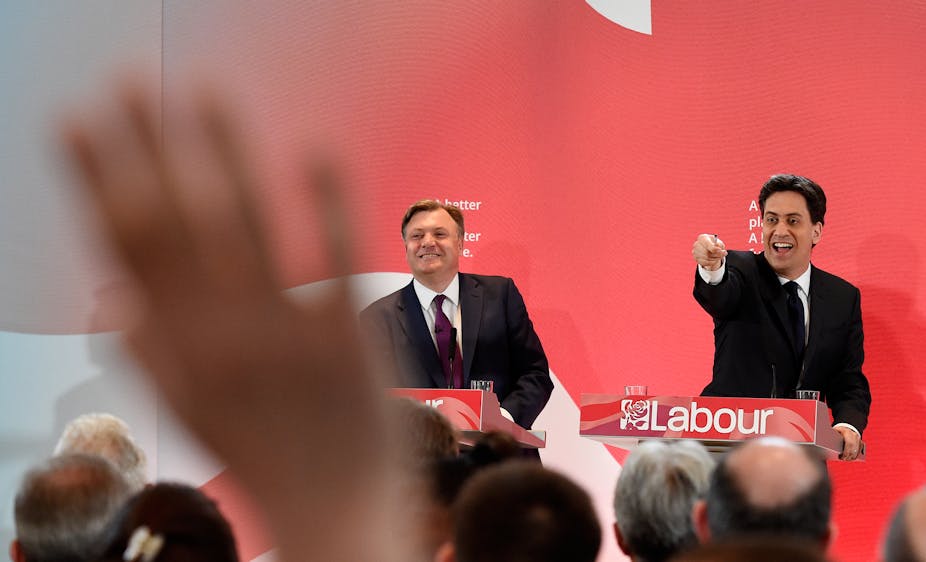As British politics has become more quasi-presidential, so the election campaign has increasingly focused on the party leaders. Much of the discussion in the 2015 campaign has focused on the question of whether Ed Miliband is up to the job of being prime minister.
But even if other party members are not being brought to the fore, Miliband is supported by a [large shadow cabinet](http://www.bbc.co.uk/news/election-2015-32222519](http://www.bbc.co.uk/news/election-2015-32222519). Some of them are hardly household names – but these are people who could be running the country before long, so it’s worth looking over their records.
The money man
One of the best known faces on the Labour team is shadow Chancellor Ed Balls. There have been reports of tensions between him and Miliband, with Balls said to be more business-friendly than the Labour leader. In a recent BBC interview, Miliband had to be pressed into saying Balls would be chancellor if Labour won the election.
The main role for Balls in the campaign has been to undermine Conservative claims that the economy is recovering while arguing that Labour has policies that are less austere but still fiscally responsible.
Balls has been pushing the message hard in the final weeks of the campaign but had to take a pause on April 28 to acknowledge Ed Balls Day.
Arguably, any publicity is good publicity, particularly if it makes you look human – and Balls approached the occasion in good humour by retweeting the infamous post.
The deputy
Harriet Harman, Labour’s deputy leader, faces accusations that she is robotic and lacking in humanity.

She has had a rather low profile in the campaign, with very little national media coverage in the closing weeks. Harman still pops up from time to time in her pink bus, dropping in on marginal seats to talk to women voters. The bus was intended to encourage women to get involved in the campaign and politics, but became the subject of much derision, thanks to the choice of colour.
Ed Miliband has refused to confirm that Harman would be his deputy prime minister in the event of a Labour victory, but it is what she expects.
However, you have to wonder what the role of a deputy prime minister would be in a Labour government. Nick Clegg used the position to keep an eye on things across government, but may have regretted not having a major departmental post. When John Prescott held the post in the last Labour government, he was parodied in Private Eye as the man in charge of the working man’s club.
The midfielders
Of the other shadow cabinet members who are potential occupants of the major offices of state, Douglas Alexander, the shadow foreign secretary, is probably the most concerned for the future. He looks to be at risk of losing his Paisley seat to a 20-year old student standing for the SNP.
This was the fate that befell Patrick Gordon Walker as shadow foreign secretary in the 1964 election. He lost to a Conservative and his career never recovered.
Yvette Cooper, the shadow home secretary, has no such worries, but home office issues have not featured prominently in the campaign and she has had a low profile.
More attention has been paid to the pugnacious shadow health secretary, Andy Burnham, who has been tipped as a possible future leader. Tristram Hunt, the shadow education secretary, has attracted attention because of his posh first name and questions about whether, having been privately educated, he would send his child to private school.
The challenger?

Chuka Umunna, meanwhile, has been one of the most prominent members of the shadow cabinet, thanks to his interesting back story as the son of an immigrant and his supposed star quality.
He too has been talked of as a possible future leader – but also derided as a hubristic Icarus, rising too high before his time and making embarrassing unforced errors in the process.
Quite where he stands in the party, and who he would rather see as leader (including himself) remains unclear. Still, that does you no harm if you have leadership ambitions. He might also hope to be a future chancellor or home secretary.
If Labour wins the election, it will be interesting to see if these contenders all get the jobs they are expecting. But what’s certain is that none of them is likely to have a major influence on the outcome, barring some disastrous gaffe. The strategy is to push Miliband to the front of the pack as much as possible – and with his stock apparently on the rise, it may at last be working.

